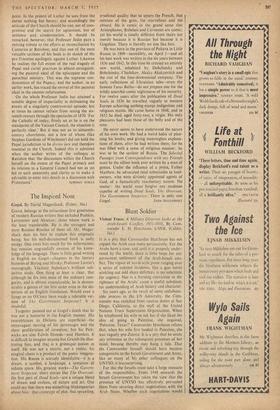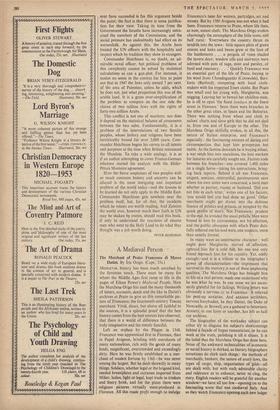Blunt Soldier
Violent Truce: A Military Observer looks at the Arab-Israeli Conflict, 1951-1955. By Com- mander E. H. Hutchison, USNR. (Calder, . 16s.) r is a pity that Commander Hutchison has not argued. the Arab case more persuasively. For the Arabs havea case, and until it is properly under- stood by the world, there is little hope for any permanent settlement of the Arab-Israeli con- flict. The vigour of naval-style prose ranging over a series of isolated incidents, like a gun turret winkling out odd shore defences, is no substitute for cogency. Nor is a burning conviction in the rightness of the Arabs' cause a useful substitute for understanding of Arab history and character.
Six years ago, as the result of some unfathom- able process in the US Admiralty, the Com- mander was switched from routine duties at San Diego, California. to the staff of the United Nations Truce Supervision Organisation. When he telephoned his wife to ask her if she liked the idea of going to Palestine. she inquired, 'Palestine, Texas?' Commander Hutchison relates that, when his wife first landed in Palestine,. she was vaguely pro-Zionist. It is a pity that he omits any reference to the subsequent processes of her mind, because thereby may hang a tale. That the Commander himself should have become antagonistic to the Israeli Government and Army, like so many of his other colleagues on the UNTSO, is less surprising.
For this the Israelis must take a large measure of the responsibility.. Rohl 1948 onwards the Israeli Government has taken the view that the presence of UNTSO has effectively prevented .them from securing direct negotiations with the Arab States. Whether such negotiations would ever have succeeded is for this argument beside the point; the fact is that there is some justifica- tion for their view. Taking its tone from the Government the Israelis have increasingly ostra- cised the members of the Commission, and the Social pressure has undoubtedly had effect on its womenfolk. As against this, the Arabs have treated the UN officers with the hospitality and respect which by tradition they show to strangers.
Commander Hutchison is, no doubt, an ad- mirable naval officer, but, political problems of this complexity cannot be solved by statistical calculations as can a gun-plot. For instance, it makes no sense in the context for him to point out that in 1947 the Jews only owned 7 per cent. of the area of Palestine, unless he adds, which he does not, just what proportion this was of the arable land. It is a gross over-simplification of the problem to compare on the one side the claims of two million Jews with the rights of forty-two million Arabs.
This conflict is not one of numbers; nor does it depend on the statistical balance of armaments between the two sides. Fundamentally, it is a' problem of the interrelations of two Semitic peoples, whose history and religions, have been inextricably bound for over 2,000 years. Com- mander Hutchison begins his survey to all intents and purposes at the time when Britain renounced the Mandate. To take a wide analogy, it is as if an author attempting to cover Franco-German relations started his analysis with the Hitler- Main Montoire agreement.
How the fierce suspicions of two peoples with so much common history and ancestry can be allayed is the most intriguing and important problem of the world today—and the lessons to be learned do not only apply to the Middle East. Commander Hutchison gets nowhere near the problem itself, but, for all that, the incidents which he relates are worth reading. And Zionists the world over, however much their faith in UN may be shaken by events, should read this book, if only to understand the reactions of sincere men who went to the Holy Land to do what they thought was a job worth doing.
PETER BENENSON



































 Previous page
Previous page